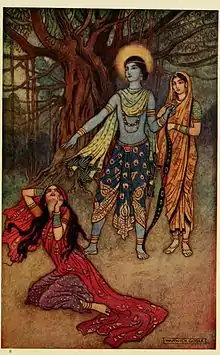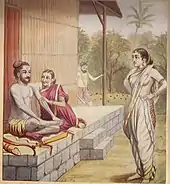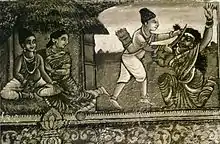Shurpanakha
Shurpanakha (Sanskrit: शूर्पणखा, IAST: śūrpaṇakhā, lit. 'she whose fingernails are like winnowing fans'), also known as Meenakshi, is a character in Valmiki's epic, the Ramayana, and appears in the other versions of the epic. She is the sister of Lanka king, Ravana, and the daughter of the sage Vishrava and Rakshasi Kaikeshi. Shurpanakha's role in the original epic is small but significant.[1]
| Shurpanakha | |
|---|---|
 Rama rejects Shurpanakha | |
| Affiliation | Rakshasi |
| Abode | Lanka |
| Texts | Ramayana and its versions |
| Personal information | |
| Parents | |
| Siblings | Ravana (brother) Vibheeshana (brother) Kumbhakarna (brother) |
| Spouse | Vidyutjiva |
Appearance and description

Shurpanakha's appearance has drastic differences in the different versions of the epic. Most Northern versions including the Valmiki's Ramayana and Tulsidas's Ramacharitamanas mention her as an ugly woman, taking an attractive form to seduce Rama. In contrast, the Southern accounts especially Kampan's Iramavataram not only present her as a beautiful woman, but also as a tragic character.[2] According to these accounts, she was thin and curved, fish eyed, adorned with thick long brown hair and a sweet melodious voice.[3]
On the other hand, when Shurpanakha first sees Rama in the forest, Valmiki describes her as "grim of eye and foul of face", "of unlovely figure", with her "dim locks disordered", a "dire form with age... dried", and "hideous fiend, a thing to hate". In her interactions with Rama and Lakshmana, the demonic woman adopted a more attractive form.[4]
Early life
Kaikesi, daughter of Sumali, married Maharshi Vishrava and became his second wife. She gave birth to four children — three sons and a daughter. The daughter was named Shurpanakha. She was also given the name of Mīnakṣī "Dīkṣa" at birth, and some also called her "Candraṇakhā" (the one with nails like the moon).
Marriage and widowhood
The popular story of Shurpanakha's marriage originated from a Tamil folktale and was absorbed into the Ramayana. As per the story, when Shurpanakha grew up, she secretly married the Danava prince of the Kalkeya Danava clan, Vidyutjihva.[5] Ravana became enraged with Shurpanakha for marrying a Danava. The Danavas were the mortal enemies of Rakshasas, and he was about to punish her, but Mandodari convinced him to respect the wishes of his sister. Thus Ravana accepted Shurpanakha, her husband and Danavas as relatives officially.[6]
At the time of conquering Rasatala (the underworld), Ravana killed Vidyutjihva. The reason of Ravana's act is different from text to text— Some claim that he accidentally killed Vidyutjihva, while other state that in Shurpanakha's absence, Vidyutjihva attacked Ravana, who in self-defense killed his brother-in-law.[7] This cause Shurpanakha a great displeasure, and after seeing his sister's grief, Ravana asked her roam and search another husband. Shurpanakha then split her time between Lanka and the woods of Southern India, sometimes living with her forest-dwelling Asura relatives, Khara and Dushana, on Ravana's orders. She also had conceived a son by Vidyutjihva known as Shambhri who was accidentally killed by Lakshmana.[2]
Encounter with Rama, Sita and Lakshmana

According to Valmiki, she met the exiled Prince Rama of Ayodhya, during one such visit to the Forest of Panchavati, and was instantly smitten by his youthful good looks. She adopted a beautiful form to entice him, but Rama meanwhile kindly rejected her advances, telling her that he was faithful to his wife Sita and thus would never take another wife. Rejected, Shurpanakha then approached his younger brother, Lakshmana, who said that he is only second to Ram and therefore not worthy of her. Infuriated by their dismissals, the humiliated and envious Shurpanakha returned to her demonic form and attacked Sita, but was thwarted by Lakshmana, who cut off her nose.[2]

Shurpanakha first went to her brother Khara, who sent seven Rakshasa warriors to attack Rama, who easily despatched them. Khara himself then attacked, along with 14,000 soldiers, all of whom were killed except for Akampana, Sumali's son and Kaikesi's brother, who fled to Lanka. She then fled to Ravana's court and spoke to her brother of the disgrace she had suffered. Her brother, hearing of Sita's beauty, decided to kidnap Sita. Akampana too played a key role in instigating Sita's kidnapping by Ravana. Despite opposition from their brother, Vibhishana, Ravana kidnapped Sita, thus triggering the Battle of Lanka.[2]
Later life and death
Although Shurpanakha receives no further mention from Valmiki, it has been suggested that she continued to live in Lanka after Vibhishana succeeded Ravana as king. She and her half-sister Kumbini are supposed to have perished at sea a few years later.
References
- Johnson, W.J. (2009). A Dictionary of Hinduism (1st ed.). Oxford: Oxford University Press. doi:10.1093/acref/9780198610250.001.0001. ISBN 9780191726705.
- Richman 1991.
- "5 Lesser known facts about demoness Surpanakha". Zee News. 17 November 2016. Retrieved 15 November 2020.
- The Ramayan of Valmiki, tr. Ralph T. H. Griffith, Trubner & Co., 1870, canto XVII
- Vālmīki (1893). The Ramayana: Translated Into English Prose from the Original Sanskrit. Dass.
- Cakrabartī, Bishṇupada (2006). The Penguin Companion to the Ramayana. Penguin Books. ISBN 978-0-14-310046-1.
- Valmiki Ramayan by Rajshekhar Basu - Uttarkanda
Sources
- Richman, Paula (29 August 1991). "The Mutilation of Surpanakha". Many Ramayanas: The Diversity of a Narrative Tradition in South Asia. University of California Press. ISBN 978-0-520-07589-4.
- Ramayana, A condensed prose version of the epic by C. Raja Gopalachari. Published by Bhavan's Book University
- Valmiki. Ramayana: Aranya Kandha
- Valmiki Ramayan by Rajshekhar Basu - Uttarkanda
External links
| Wikimedia Commons has media related to Surpanakha episode. |
.jpg.webp)
